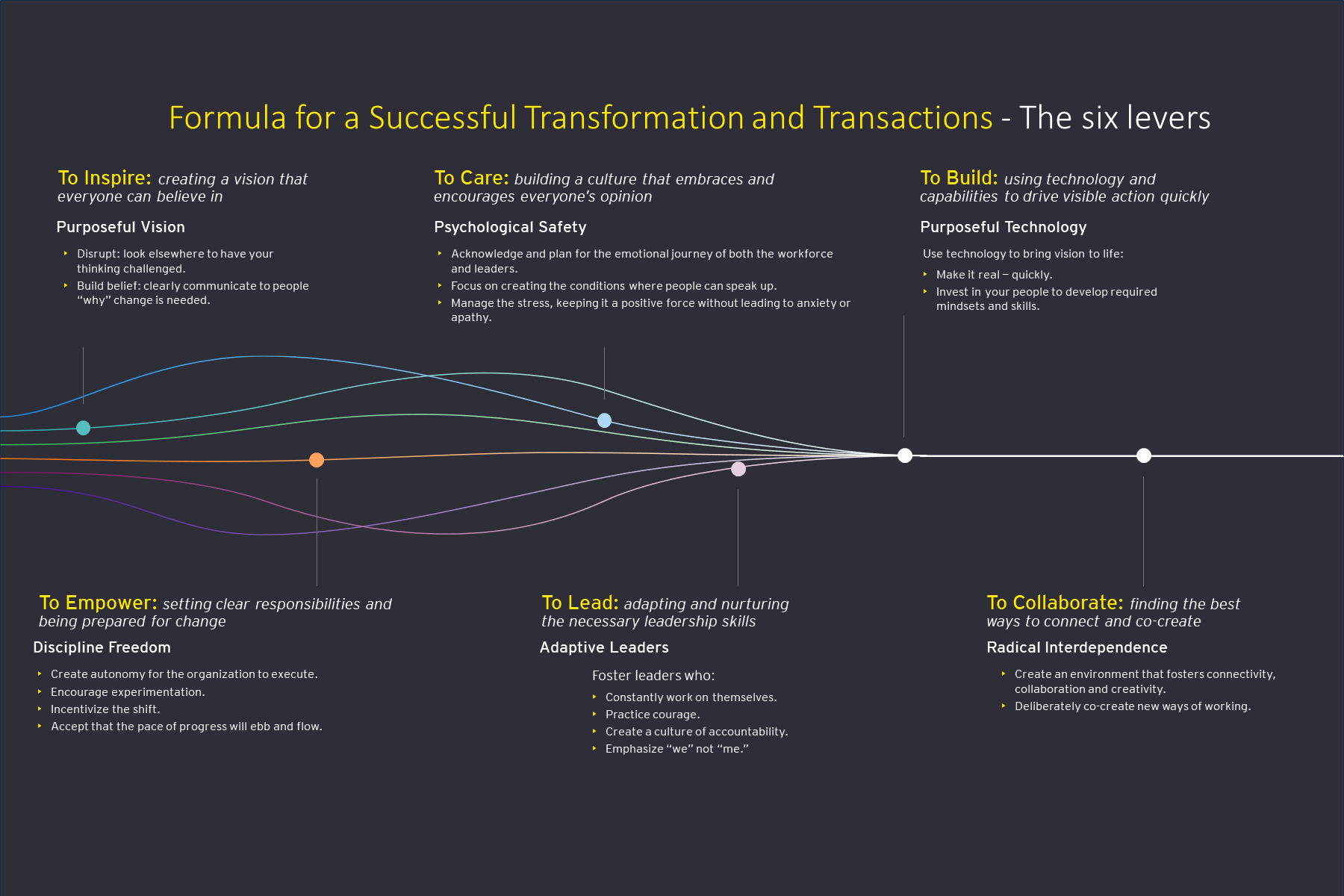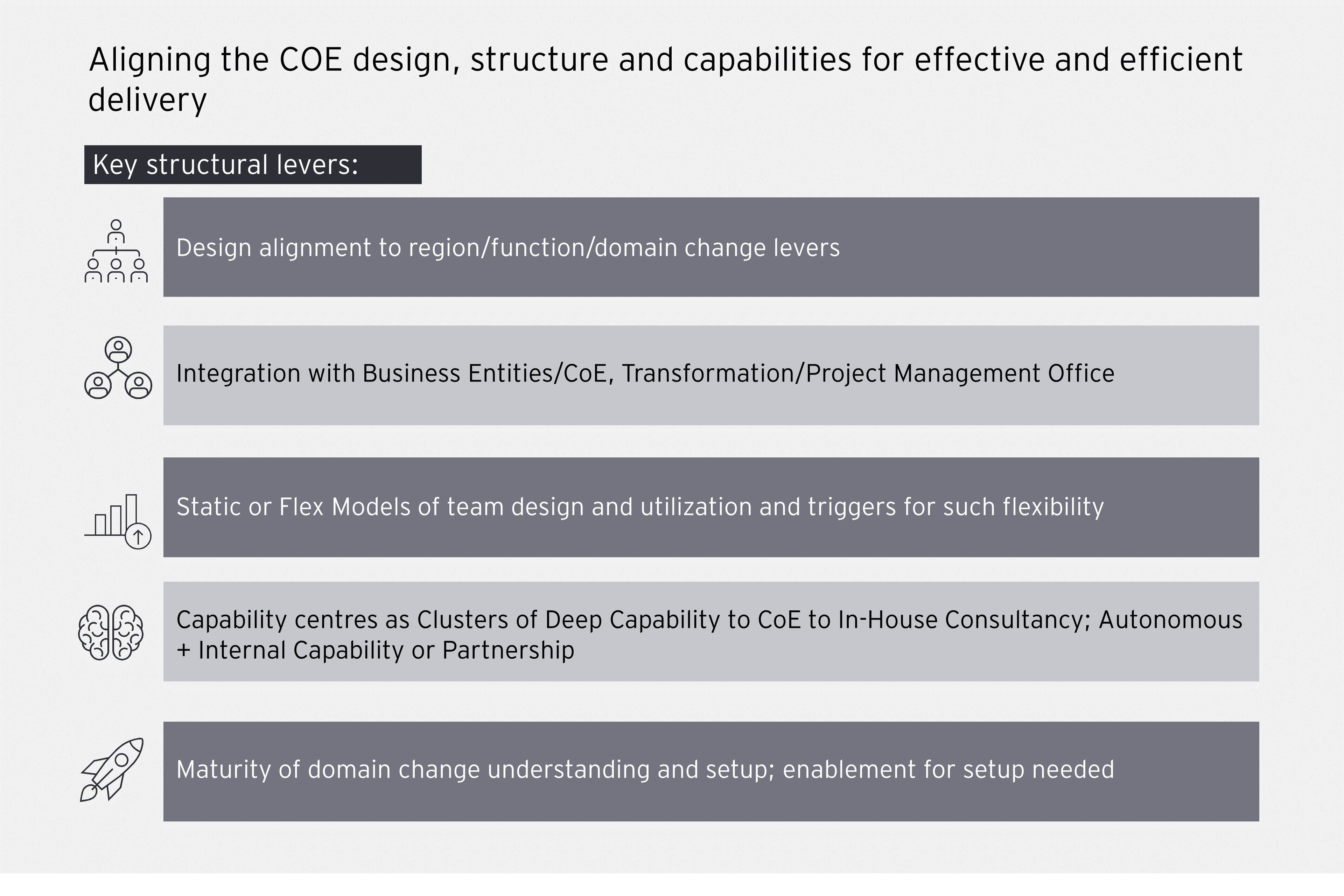EY refers to the global organization, and may refer to one or more, of the member firms of Ernst & Young Global Limited, each of which is a separate legal entity. Ernst & Young Global Limited, a UK company limited by guarantee, does not provide services to clients.

Global Capability Centers (GCCs) are at the core of transformation programs, with many unique capabilities which make them good change drivers.
In brief
- GCC’s transformation from change acceptors to change enablers positions them as a guiding force to achieve sustainable transformations.
- GCCs leverage their multifaceted experience and drive effective transformations in the global landscape, ensuring adaptability and meaningful change.
Over the past 30 years, only one in 10 transformations has achieved the targeted return on investment. As per Prosci1, 70% of transformation programs fail because of ineffective change management. EY, in collaboration with Oxford Said Business School, explored the reasons for this and aimed to codify the anatomy of transformational success.
The findings suggested that transformations that are “human-centered2” are 2.6 times more successful. It was found that six drivers dramatically increase the success rate, by centering people at the heart of all transformations and leading transformation with a focus on change experience is crucial.

Today, GCCs can drive value for the enterprise through effective change management and are at the core of these transformations. GCCs have realized the value of change management as a part of the delivery model. They are constantly evolving and playing a pivotal role by leading transformation programs and managing multiple functions to drive value for the organization. As per the EY GCC Pulse Survey 20233, 77% of participants believe that GCCs are focusing on building a culture of innovation. They leverage their multifaceted experience to understand the audience, define critical impacts, and deploy effective change management strategies to mitigate the risks and realize sustainable objective.
GCCs are transforming from change acceptors to change enablers, positioning them as proactive architects of positive and lasting transformations in the global business landscape, ensuring adaptability and driving meaningful change. GCCs leverage their multifaceted experience and drive effective transformations by harnessing elements, such as cross functional capabilities, end to end ownership of processes and transformation programs, and an experienced workforce.
GCCs leverage their multifaceted experience and are able to drive effective transformations by harnessing the following features:
1. Cross-Functional capabilities
Employing over 1.6 million people, GCC’s today have evolved into innovation hubs, equipped with access to top talent across diverse functional capabilities and lead different functions like finance, HR, analytics, IT, procurement, data governance, etc. within their scope. They deploy their expertise to manage the change and transformations more effectively by focusing on end-to-end solutions.
A British retailer strategically led by a change management team in the GCC spearheaded the implementation of a new project management tool across over five geographical locations with over 1500 end users. With over 54 learning content videos created and more than 30 communication assets, the platform has seen a 92% adoption rate in the pilot, ensuring a seamless transition.
2. End-to-End ownership of processes and transformation programs
GCCs with their cross-functional capabilities have end-to-end ownership of transformation programs. According to EY’s GCC Pulse survey 2023, 79% of GCCs are acting as global hubs for digital skills and delivery. They have access to a multiverse of data-driven and analytical insights. Analyzing the trends of the business as well as the market, GCCs can help deploy effective training and change management modules for employees to upskill themselves. The GCC of a leading global FMCG company, headquartered in Bengaluru, plays a pivotal role in driving purpose-led growth for the organization worldwide through transformation programs focused on processes, technology, and data. Its core responsibility lies in providing technological and data infrastructure that supports and drives the organization's activities.
This encompasses data and analytics, which involves managing data platforms and developing analytics products to facilitate informed decision-making along with delivering, innovating and maintaining secure technology products which support the company's operations and growth. An example of such a transformation program includes ‘product data management’, which focused on embedding a new efficient way to create, manage and showcase their end-to-end product data.
3. Collaborative and change-experienced workforce
GCCs can play a pivotal role in enhancing the success of the project by deploying globally driven yet locally aligned change management solutions. With a multi-dimensional workforce engaged with diverse geographies and stakeholders, they are natural change agents. A leading agri-business company leveraged its GCC for managing and changing its HR processes across different geographies. A GCC’s Organization & Change Lead had conducted change management guidance sessions at the country level to understand the dynamics of culture, demographics and the ways of working. The training modules were then translated into local languages. The Organizational change management (OCM) lead leveraged the change-ready workforce to create surveys and modules to map the change impact analysis at a local level and highlight the key focus areas to the business to mitigate risk and enable smooth transformation.
This in-depth understanding of local requirements enabled greater partnership from the local teams and contributed to the success of the project. GCCs with their unique capabilities, global reach and diverse talent pool are well placed to deliver the large-scale transformations and effective Change Management is key to the value realization of these projects. More and more organizations are realizing the value of complementing and integrating project management and change management together as part of programs. Change management teams within a GCC can use data-driven insights to understand impacts, identify cultural nuances and create tailored strategies to effectively land and sustain change across multiple geographies and cross-functional teams, positioning GCCs to be the Centre of Excellence (CoE) for change.
GCCs’ leading with a change Centre of Excellence (CoE)
With growing scale and pace for change, organizations are realizing the need for a change management CoE within GCCs for delivering accelerated transformative value. Embedded into the structure as a centralized or federated model, a change CoE within GCCs is critical to enable strong partnership with business and project management.
The CoE assists in the delivery of projects by providing key change configuration, strategy/storytelling, planning and execution of needed change for adoption. Building and leveraging change networks, it partners with the business intelligence and analytics teams on performance reporting, draw insights and plans tactics for sustenance of change. With emphasis on continuous learning, it would institutionalize key insights and self-service enablers where needed. Designed to grow with the needs of the organization’s transformation, the CoE evolves through phases, starting with delivering vital functionality and core change capabilities and ultimately expanding the offering to the wider organization by structuring itself across key levers.

Change as a service
At EY, we believe that change should be experienced and not managed. The firm’s change experience approach is one that is agile, user-centric, and insights-led, designed to help the organizations adapt to and navigate through complex, continuous transformation. We create exceptional change capability and experiences by leading with purpose, pivoting with insights, connecting with personalization and immersive adoption.
We work collaboratively with our clients to deliver a consistent change experience that can flex to the unique needs of each transformation program. With change as a service, we recommend six key tenets, namely mutual sponsorship, shared methodology, strategic view of change, resource consistency, knowledge transfer and cultural alignment. Our practitioners can equip projects with core capabilities of change strategy and delivery management, engagement and behavior change strategies, business readiness and benefits tracking, learning and knowledge transfer, all to maximize adoption and engagement.
(Aniket Deshpande, Director and Tanmay Khanolkar also contributed to the article)
How EY can help
-
Our Global Capability Centers(GCC) Advisory practice, led by a team of professionals can help your business be future-ready for the digital disruption.
Read more -
Global Capability Center-as-a-Service (CaaS) at EY offers end‑to‑end GCC setup, scaling & transformation solutions to drive strategic innovation & growth.
Read more -
Strategic HR Transformation team at EY specializes in HR management, consulting & strategy—evolving HR into a human value activator that drives innovation.
Read more
Related content
Why companies leverage GCCs to establish in-house Centres of Excellence
Explore why firms expand Global Capability Centers (GCCs) into in-house Centres of Excellence (CoEs) as innovation hubs to drive efficiency and growth.
Embracing the future: GCCs spearheading innovation with new-age services
Discover how GCCs are diversifying their suite of offerings by adding new-age services to their service portfolio.
Join us at EY GCC GenAI Conclave, India’s flagship event for GCC leaders exploring trends and insights shaping the future of Global Capability Centers.
Summary
With their unique capabilities, global reach and diverse talent pool GCCs are delivering large-scale transformations for organizations and have rapidly become change enablers from change acceptors. Change management teams within a GCC can use data-driven insights to understand impacts, identify cultural nuances and create tailored strategies to effectively land and sustain change across multiple geographies and cross-functional teams.






